Norm Dicks '63, '68, does not enter a room so much as occupy it. At three inches shy of six feet, he is not especially tall, but shoulder-to-shoulder, the former University of Washington lineman has width and mass, like a washing machine. The years have added some padding in spite of his vigorous tennis regimen, and they've tinged his sand-colored hair with gray. But it's still an inch thick and wavy, like a much younger man's. And when Dicks speaks, it's with a basso profundo and a natural amplification that makes every sentence an announcement.
Thirty years of on-the-job training in the United States House of Representatives, serving a large, coastal slice of Washington state, have contributed to Dicks’ knack for commanding attention. But one gets the sense that a good deal of his appeal is innate. Two decades ago, when he was still a relatively junior congressman, Dicks insinuated his way into a role in the arms-control talks between the United States and the Soviet Union, becoming the eyes and ears of the House at the Geneva summit in 1985.
His resume is impressive in other respects: UW athlete-scholar in the 1960s, a top U.S. Senate aide at age 28, winner of 15 re-election campaigns, a player in some of the major national security debates of the previous century. It’s no wonder that the new speaker of the house, Nancy Pelosi, calls Dicks “a man of keen intellect and great enthusiasm.”
Dicks and his wife, Suzie, a petite physical contradiction to Dicks, have been close friends of Al and Tipper Gore since the day both men came to Congress in 1977. Gore recently told one reporter that he might have tapped Dicks for secretary of defense if he had prevailed in the 2000 presidential election.
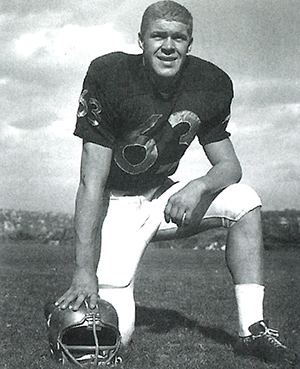
Norm Dicks during his playing days at the UW.
In spite of those milestones, it has, at times, been a frustrating career. The timing for a Senate run was never quite right, and a seemingly perpetual Republican majority over the past dozen years kept him from securing a chairman’s gavel. At age 66, he gave serious thought to retiring.
Then came the election of 2006, which realigned the political landscape, and with it, Dicks’ future. In January, he became chair of the Interior and the Environment Appropriations Subcommittee, which controls a $26 billion annual budget. It sets spending for the national park system, environmental protection, the country’s oil reserves and American Indian reservations. “This is a committee that has jurisdiction in areas that are important to Washington state and to the country. I can play a real leadership role,” Dicks says during a leisurely interview in his office at the Rayburn House Office Building. “Hell, I’ve been on the committee for 30 years. I finally made it.”
His promotion to the top job on the interior panel presents his best opportunity to shine. Dicks wants to resuscitate national strategy on global warming, boost spending for national parks and put protection of Puget Sound on par with that for the Great Lakes and Chesapeake Bay.
Dicks is also the second most senior Democrat on the defense spending subcommittee, after powerhouse John P. Murtha. This not only gives him a voice in policy towards Iraq, but also puts him in a position to oversee the state’s substantial military economy.
Republicans still control the White House, and Democrats have only a one-seat advantage in the Senate, so there are limits to what the new majority party in Congress can accomplish. But with Democrats holding the federal purse strings, Dicks foresees significant changes, with more money going to traditional Democratic priorities—such as health care and the environment—and less to income tax cuts, which have been a focus of the Bush administration.
“Our problem is going to be, we have to be realistic,” Dicks says. “We have a $300 billion deficit. We’re not going to be able to do everything.”
***
Dicks represents a nature-lover's paradise—the lush coast of the Olympic Peninsula, the home of primeval evergreen forests, snow-glazed mountains and gorgeous Pacific beaches. But Dicks himself is a product of another side of the 6th Congressional District, one characterized by hard-working, plain-Jane towns dependent on military bases and shipping ports.
Dicks grew up in Bremerton, the son of Horace Dicks, an enlisted man from New York, who met his future wife while stationed at Puget Sound Naval Shipyard. After his service, the senior Dicks took a job as a shipyard electrician and settled in to raise a family. Dicks’ mother, Eileen, comes from a family that reaches back to frontier days and has kept a summer place on Hood Canal for generations. Politics runs through his family lineage. Dicks’ grandfather was chair of the local Republican Party chapter, though Dicks likes to say he was an “enlightened, Rockefeller Republican.”
With his father’s encouragement, Dicks excelled in sports in high school, going out for football and basketball while maintaining better than a B average. He was good enough to make the football team during his freshman year at Washington. At that time, Jim Owens was coach, and the UW was a powerhouse. In 1960, the year Dicks joined the team, the Huskies played a 10-1 season, went to the Rose Bowl and beat Minnesota 17-7. “Those were the days you did not have all these other bowls,” Dicks says. “It was the Rose Bowl or nothing.”
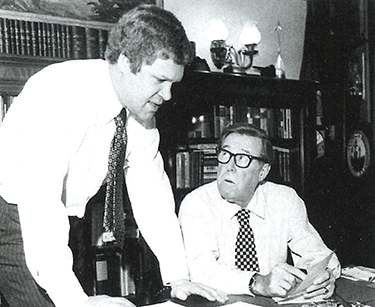
Dicks was a staff member for Sen. Warren Magnuson, ’29, before running for Congress.
A feisty guard, Dicks played with abandon, earning himself the nickname “Dizzy Dicks.” His most memorable moment came in his last game as a Husky. It was the final game of the 1962 season, and UW was playing rival WSU in Joe Albi Stadium in Spokane. The score was tied 21-21 when the UW quarterback threw an interception at the seven-yard line. Owens took Dicks off the bench and sent him in with a minute and a half to go. Dicks intercepted a pass by the Cougars’ quarterback, and the Huskies were able to win, 26-21. Dicks was carried off the field on the shoulders of his teammates.
“It was a great way to bow out and end a football career,” says Dicks, who was hindered by injuries, including a bad knee, and knew he wouldn’t be able to go pro.
As much as he loved football, Dicks says he was more interested in pursuing politics as a career. He was elected to the ASUW Board of Control, which satisfied both of his major interests—the board at that time had a large say in the athletics budget. “That was the only time in my whole career that I ran unopposed, and I was worried until the last minute that there would be a write-in candidate,” Dicks recalls.
He joined the Sigma Nu fraternity, the house of many of his teammates. And he chose political science as a major, making the dean’s list. Among his most inspirational professors was legendary History Professor Giovanni Costigan. “He talked without notes for hours about history and culture and economics, along with a good psychoanalysis of every world leader,” Dicks recalls.
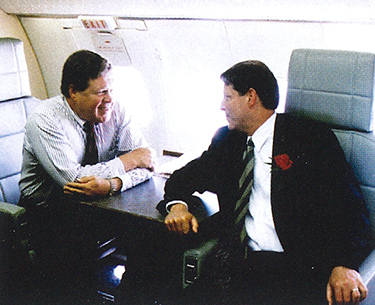
Dicks and Vice President Al Gore share a quiet moment on Air Force Two.
Dicks went on to get a law degree from the UW in 1968, he says, as part of his preparation for going to the other Washington. He and some fellow students tested their entrepreneurship by renting ballrooms and throwing singles bashes, providing drinks and music, and charging $5 admission. The parties turned a profit and resulted in a bigger prize for Dicks: He met Suzanne Callison at one of them. Dicks continued as a party planner after he married Callison, he says, “until my new father-in-law suggested I drop out of the business.”
In 1968, after graduation, Dicks went to Washington, D.C., to meet with the chief of staff of Sen. Warren G. Magnuson, ’29, hoping for help landing a job with the National Labor Relations Board. Magnuson liked him so much, he hired him instead as a legislative aide.
It was a heady time for a young politician-in-training. Martin Luther King Jr. and Robert F. Kennedy were both assassinated, clashes between protesters and police shook the Democratic National Convention in Chicago, and the country was split over the war in Vietnam. In three years, Dicks made administrative assistant, the top staff job. Meanwhile, he quietly watched political developments back in the 6th District, which included his hometown of Bremerton. Rumor had it that incumbent Democrat Rep. Floyd Hicks wanted to retire.
When Hicks was named to the state Supreme Court in 1976, Dicks was ready. With the practical savvy and connections he acquired from Magnuson, Dicks tapped the resources of organized labor and other special interests to beat three competitors in the Democratic primary, including the mayor of Tacoma. After that, winning the general election against a weak Republican opponent was a snap.
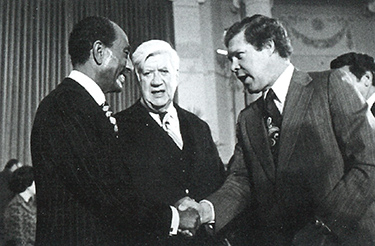
Dicks shakes hands with Egyptian President Anwar Sadat as House Speaker Thomas P. “Tip” O’Neill (center) looks on.
Freshman Dicks set his sights on a hard-to-get seat on the powerful Appropriations Committee, which controls the federal purse strings, and beat out another ambitious House newcomer, Albert Gore Jr. of Tennessee, to win the appointment.
As the newest member of the panel, Dicks knew he was very likely to end up on one of two lesser subcommittees, the one controlling spending for the District of Columbia or the one responsible for Congress’ own administrative budget. Dizzy Dicks went to work, plotting an audacious plan to snare a better assignment. With a blitz of letters and phone calls to his new colleagues, Dicks lobbied successfully to expand the size of the committees that he targeted, making room for him. Two new seats were added to the interior subcommittee, and Dicks got one of them. Today, after 30 years, he is the subcommittee’s chair.
In his early years on Capitol Hill, Dicks displayed a combination of smarts and willfulness. If he could sometimes be on the loud and insistent side, he was at least a likeable bull in the china shop, with a boisterous bonhomie and ready sense of humor. Democratic Sen. Patty Murray of Washington state says, “Norm is the best cheerleader you could have on your side. If he says he’s going to move on something, he does. He doesn’t quit and move on to something else.”
Mike Egan, ’90, a former Dicks aide and now director of corporate affairs for Microsoft, says, “Norm gets respect not just from the Democratic side. I do hear from my Republican friends that Norm is a guy you can work with. I think that’s a tribute in this day and age when things have become very partisan.”
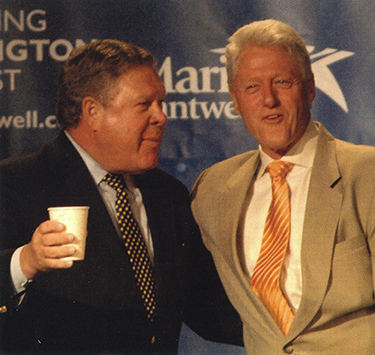
Rep. Norm Dicks and President Bill Clinton are
all smiles during an October 2006 campaign appearance for Sen. Maria Cantwell.
Barbara Perry, the UW director of federal relations in Washington who has worked on several issues with Dicks, says, “My first impression of him was that he was intimidating. He has a powerful presence. And I’ve learned that he is still intimidating, but he’s also very personable. And he’s very much a can-do person.”
In 1983, Dicks was at the center of the debate over placing a freeze on production of new nuclear weapons in the United States. Congressional Quarterly noted at the time that Dicks neither was among the early activists nor had a seat on the Foreign Affairs Committee, which brought the freeze resolution to the floor. “But by the time the House finally passed a freeze in May 1983, after more than 40 hours of debate, Dicks had made himself a force in the negotiations,” CQ said.
During the same period, Dicks jumped into the volatile talks between Congress and the Reagan administration over development of the MX missile, which many of Dicks’ fellow Democrats opposed because they believed it would escalate the Cold War. Using his leverage on the defense appropriations committee, he formed an alliance with Gore and Les Asp in of Wisconsin. They helped Reagan fend off opposition to the MX in the House in return for agreement that the program would be part of a larger strategy to compel the Soviet Union to reduce its weapons stockpile.
“He certainly was a major player then and certainly quite vocal,” recalls John Isaacs, who heads the Council for a Livable World, a Washington, D.C.-based nuclear disarmament organization. “That group was influential in cobbling a deal that allowed Congress to approve some of the MX missiles.”
In the 1990s, as the senior Democrat on the House Committee on Intelligence, Dicks was heavily involved in early efforts to streamline clunky and inefficient intelligence agencies. Much later, the 9/11 commission would recommend steps Dicks and his colleagues had advocated 10 years prior.
Quoting the late Sen. Henry “Scoop” Jackson, ’32, a legendary defense hawk who has influenced his career, Dicks says, “When it comes to national security, the best politics is no politics.”
***
While burnishing his image nationally, Dicks did not forget his home state. He secured millions of dollars for urban redevelopment of Tacoma, which was instrumental in the creation of UW Tacoma. Dicks pushed for increases in federal funding for basic research, which sustains discovery at major universities such as the UW, Perry says. For example, Dicks and Murray worked to secure $12 million in federal funding for the new Foege Building on the south campus.
In Dicks’ office is a model of the B-2 stealth bomber, which Boeing helped build and Dicks pushed relentlessly. He embraces the role of “Mr. Boeing,” as he is sometimes known, to a fault. In recent years, Dicks championed a $21 billion deal in which Boeing would modify its 767 model into 100 Air Force tankers, keeping that production line going after commercial demand had dropped.
But the contract was canceled after Republican Sen. John McCain lambasted the leasing arrangement as a bad deal for taxpayers and an Air Force procurement official admitted to illegally helping the company while negotiating a job with Boeing. In the end, Boeing CEO Phil Condit resigned and two Boeing executives went to prison. This year the Air Force will consider tanker proposals again, including the original 767 model, and an EADS-Northrup Grumman design based on the Airbus A330.
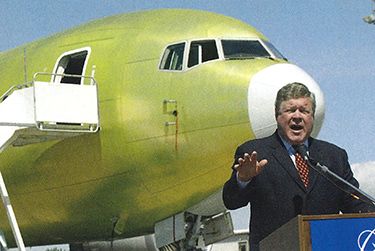
Dicks praises the first model of the Boeing 767 Tanker Transport aircraft to roll off the production line at Boeing’s Everett plant in 2003.
Mr. Boeing also wants to be known as Mr. Green. Over the years, Dicks has championed environmental causes. Global warming is a key issue now and in the future, he says. And in 2000, he authored a law adding vast tracts of wilderness to the federal conservation trust. However, he has sometimes disappointed the environmental lobby with his defense of the state’s timber industry, as he did during the spotted owl battle in the early 1990s.
Ever a Huskies fan, the former UW lineman still attends three or four football or basketball games a year. He is now a competitive amateur tennis player, but his devotion to the Huskies is apparently unabated. His tennis partners say that when he scores a point during tournaments, he sometimes enthusiastically shouts out: “Huskies!”
There is no question that Dicks is a key booster for the UW in Washington. Perry recalls that she once met with Dicks about a new medical device the school was developing. Dicks declared they’d need the Senate’s help, then picked up the phone and called Democratic Sen. Daniel K. Inouye of Hawaii, a member of the Senate’s appropriations committee. He then walked Perry across the Capitol and delivered her to a pivotal meeting with Inouye. “I was dumbfounded,” Perry recalls. “There’s no pretense to the guy. He just sees what needs to be done and does it, without fanfare.”
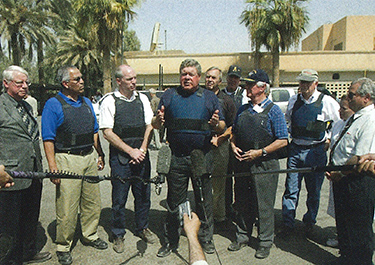
Dicks (center) visits the AI-Yarmouk Hospital in Baghdad with other congressional representatives in September 2003.
During one stretch in his career, Dicks wanted to be a senator himself. He considered running in 1988, when Sen. Daniel J. Evans, ’48, ’49, retired, but he and his advisors determined that his support for the MX and other pro-defense positions made him unmarketable statewide, especially with liberal voters in and around Seattle.
Dicks figured that it was only a matter of time before he became a committee chair in the House. But more senior Democrats were always ahead of him and the Republican victory of 1994 put those ambitions on hold.
Early last year, Dicks considered retiring. He thought about his increasingly satisfying role as family patriarch; his two grown sons are both out of college and pursuing careers in the Seattle area. Last year he became a grandfather for the first time. Dicks also had visions of enjoying daybreak on Puget Sound with a fishing rod in his hands, his personal heaven on Earth. “I must say, had we not won the majority this time, it would have been very tempting to go home,” he says.
Now, with his party back in the game, Dicks’ career drought is ending. After Democrats won in November, Dicks was considered by Pelosi for chairman of the Intelligence Committee, another prime spot. Dicks says he took himself out of the running because he wanted the gavel at Interior, a committee he’s called home since his first days in the House.
“It’s very hard to quit this place,” Dicks says. “Where else can you go and do things like I’ve been able to do? I still enjoy the work, and so much needs to be done.”
Washington buzz: Dicks on the issues
The War in Iraq: As a widely respected expert on military matters, Dicks was an influential Democratic voice for going to war with Iraq. He voted for the Bush administration’s war resolution in 2002. Like many members of Congress, he says now that he based that vote on “inaccurate or overstated information about the capability and intentions of the Iraqi government.”
“We need to change direction,” Dicks says. “Our strategy in Iraq is not working. It will not produce the victory we all say we believe in. Nor will it allow us to see far enough ahead to the time when we can legitimately redeploy our troops and bring them home. … I believe it may be time to take the training wheels off, and to communicate directly to the Iraqis that they are running their own nation, as unsteady as it may seem in the near future.”
Global Warming: “The Congress and the former majority party have ignored it, but global warming exists, it’s caused by human activity and it’s getting worse,” Dicks says. “I think Al Gore is right on the substance of this.”
Funding for National Parks: As chair of one of the powerful spending subcommittees, Dicks will push the Bush administration for more money for park rangers and maintenance staff, saying he’s prepared to hold up money for perks like executive staff and travel for the Interior secretary if necessary. He keeps handy a chart showing that budgets for Interior and the Environmental Protection Agency declined while other parts of the government grew during the Bush years. From the top of his head, he readily calls forth outrages closer to home, like the fact that staffing at Mount Rainier is down 10 percent. “At some parks, the decline was dramatic,” Dicks says. “And it seriously affected the quality of the visitor experience.”
On the University of Washington: Dicks has long helped the school with federal funds for major projects, including the UW Tacoma campus. “The University is extremely important. It’s the largest university in the region, and it gets more federal dollars than any other public university in the United States. It is a great research institution,” Dicks says.